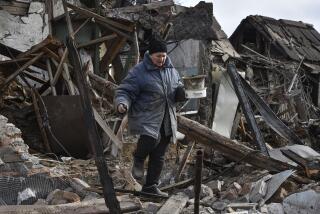Russia Removes Last Hurdle to Bosnia Air Strikes : Diplomacy: Moscow won’t insist U.N. chief seek Security Council approval. Ambassador requests meeting to find other ways to demilitarize Sarajevo.
UNITED NATIONS — Russia removed the last legal obstacle Thursday to the calling of air strikes in Bosnia-Herzegovina by U.N. Secretary General Boutros Boutros-Ghali when it dropped its insistence that he seek new Security Council approval before he acts.
Russian Ambassador Yuli Vorontsov told reporters before he met with other ambassadors of the Security Council that his government was not trying to prevent North Atlantic Treaty Organization planes from bombing Bosnian Serb positions. “Who said that we are stopping anything?” he told a questioner.
When asked about Boutros-Ghali’s contention that he does not need any further approval from the council, Vorontsov surprised everyone by replying, “The man is absolutely right.”
The Russian ambassador did present the other diplomats with a formal request from the Russian Foreign Ministry for an urgent meeting of the Security Council “to consider practical ways to demilitarize Sarajevo and to introduce there a United Nations administration.” A demilitarized Sarajevo under U.N. administration is one of the proposals under consideration at the Bosnian peace conference in Geneva.
Many U.N. diplomats had feared that the Russian attempt to bring this issue before the Security Council was an attempt to thwart any air strikes. But Vorontsov told reporters, “It’s complementary, not a substitute.”
Ambassador Roble Olhaye of Djibouti, who is president of the Security Council this month, said the ambassadors had acceded to the Russian request for a meeting, but only partly. The Security Council had planned a public meeting today in which all U.N. members would be able to offer their views on Bosnia. Vorontsov was invited to discuss his proposal at the same time. But Olhaye said that the Russians would not be allowed to introduce a resolution or call for a vote at the meeting.
With the Russian obstacle removed, Boutros-Ghali assumes the role of the key figure with the power to order air strikes in Bosnia should they prove necessary. U.N. diplomats said that, although the secretary general has long been wary of such military action, he has crossed a threshold and would have no hesitation about ordering air strikes now.
There was some confusion at the United Nations, however, about the exact nature of the secretary general’s role. European diplomats said that Boutros-Ghali had the right to order air strikes both before and after the expiration of the 10-day ultimatum for the removal of Bosnian Serbs’ heavy weapons from the hills around Sarajevo.
The strikes could be ordered before, the diplomats said, if artillery fires on Sarajevo; afterward, Boutros-Ghali could order the strikes to take out the heavy weapons that had not been removed.
A senior French diplomat, however, described these orders as “a shared initiative,” implying that Boutros-Ghali would surely consult with NATO before ordering its planes into action.
Any air strikes before the ultimatum expired would probably simply take out the battery that had been firing, the European diplomats said. Boutros-Ghali would order each such air strike separately.
But, the diplomats said, any order for air strikes that came after the 10 days were over would amount to a general order for NATO to attack the emplacements at will, without waiting for approval from Boutros-Ghali for each air strike.
The senior French diplomat nuanced this somewhat, saying that Boutros-Ghali would be consulted on each of these strikes and would have “the power to prevent--to say, ‘Don’t do it.’ ”
To illustrate this scenario, the diplomat described a situation in which NATO pilots spotted a Serbian battery still firing. “NATO will say, ‘There are batteries. We have to take them out. Is it OK?’ ” The diplomat said that Boutros-Ghali would surely approve unless he feared the air strikes would threaten the lives of U.N. peacekeepers or humanitarian workers.
The French diplomat said that he believed that Boutros-Ghali would not object to this role. “I don’t think he will mind so long as it (the order for air strikes) is done in close coordination with the secretary general,” the diplomat said.
Others doubted that the secretary general would actually have any veto power, as there probably would be little time for him to stop the air strike once NATO had told him about it.
Vorontsov told reporters that he believed Boutros-Ghali would never have to use his authority to order air strikes because the Bosnian Serbs would comply with the demand that they leave Sarajevo.
Vorontsov’s discussions with the Security Council seemed much more moderate than the statements made earlier in the day in Moscow.
“Why should NATO decide the issues of a peace settlement, and what’s more, by issuing ultimatums and threatening the use of force?” First Deputy Foreign Minister Anatoly Adamishin told the Interfax news agency. “This is not NATO’s business. It is the United Nations’ business.”
Times staff writer Sonni Efron in Moscow contributed to this report.
More to Read
Sign up for Essential California
The most important California stories and recommendations in your inbox every morning.
You may occasionally receive promotional content from the Los Angeles Times.










